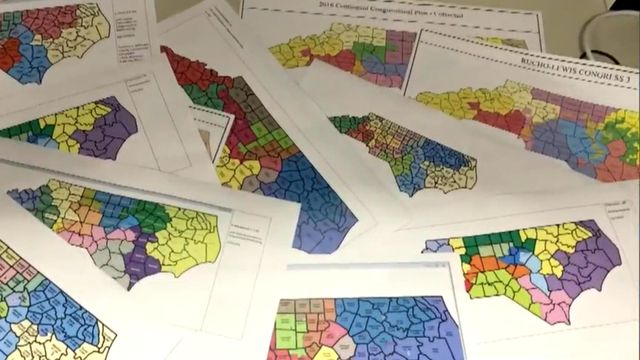Want some say in how NC lawmakers redraw voting maps? Here's your chance
Lawmakers will hold public hearings this month in each of the state's 13 congressional districts as they get ready to draw new maps for legislative and congressional voting districts.
Posted — UpdatedThe hearings will give voters a chance to tell lawmakers what’s important to them, Western Carolina University political science professor Chris Cooper said Tuesday.
Even small changes to district lines can make a big difference in which party is likely to win a specific district, he said.
"Everything is at stake, I mean, in terms of politics, in terms of who represents us going forward," he said.
Lawmakers are required to redraw the districts every 10 years with updated census data. They have to try to keep the state's districts equal in population so everyone’s vote counts the same.
The party in power, which has been Republicans for the past 11 years, always tries to draw the districts to its own political advantage. But that could be complicated this year.
North Carolina’s population has grown by almost 10 percent in the past decade, which has earned the state another congressional seat. But the growth was uneven – most of it was in urban and suburban areas, while many rural counties lost population. That could mean a shift in political power.
"In the state of North Carolina, we have 100 counties. About half grew, and about half shrank," Cooper said. "The ways in which this grew and shrank over the last 10 years, that's what's going to determine, ultimately, how we're represented and who we're represented by."
Anyone who wants to weigh in on how lawmakers should draw the new maps can go to one of the 13 meetings:
- Wednesday: Caldwell Community College and Technical Institute, 6 p.m.
- Sept. 14: Forsyth Technical Community College, 4 p.m.
- Sept. 14: Elizabeth City State University, 5 p.m.
- Sept. 15: Nash Community College, 5 p.m.
- Sept. 15: Durham Technical Community College, 6 p.m.
- Sept. 16: Pitt Community College, 3 p.m.
- Sept. 16: Alamance Community College, 5 p.m.
- Sept. 21: Western Carolina University, 5 p.m.
- Sept. 22: Central Piedmont Community College, 3 p.m.
- Sept. 23: Mitchell Community College (Iredell County campus), 3 p.m.
- Sept. 28: UNC-Pembroke, 4 p.m.
- Sept. 29: UNC-Wilmington, 5 p.m.
- Sept. 30: Fayetteville Technical Community College, 6 p.m.
"We are committed to an open and transparent process, which starts with hearing from the constituencies of all 13 current congressional districts," Rep. Destin Hall, R-Caldwell, the House point man on resdistricting, said in a statement. "We have already had over a month of public comment on our online portal, resulting in an unprecedented amount of public input."
But Bob Phillips, executive director of Common Cause North Carolina, a left-leaning good-government group, criticized lawmakers for not livestreaming the hearings or providing a way for people to participate virtually in real time amid the coronavirus pandemic. He said he hopes lawmakers fix that problem once maps are drawn and they again seek publuc input.
"Virtual participation available in real time and public hearings held in multiple parts of the state after the maps are drawn must be part of the process. Otherwise, far too many North Carolinians will be shut out of redistricting," Phillips said in a statement.
Related Topics
• Credits
Copyright 2024 by Capitol Broadcasting Company. All rights reserved. This material may not be published, broadcast, rewritten or redistributed.





